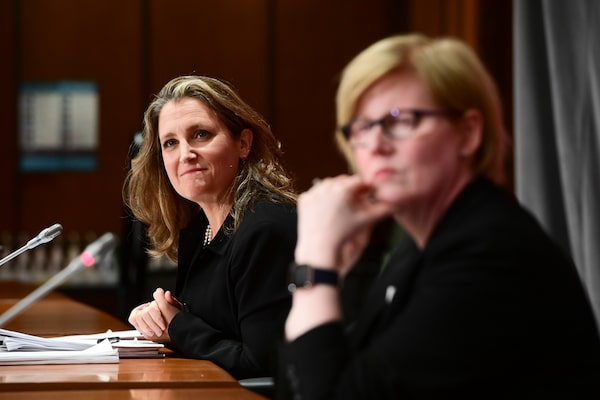
Minister of Finance Chrystia Freeland and Minister of Employment, Workforce Development and Disability Inclusion Carla Qualtrough hold a press conference on Parliament Hill on Sept. 24, 2020.Sean Kilpatrick/The Canadian Press
The Liberal government plans to make income-support programs more generous and to extend the use of emergency spending powers through to the end of the year.
The proposed measures are contained in Bill C-2, the COVID-19 Economic Recovery Act, which was introduced Thursday in the House of Commons.
The bill sets the new Canada Recovery Benefit at $500 a week, up from the $400 amount announced last month, in a change NDP Leader Jagmeet Singh described as “a big win” that responds to a key NDP demand after the release of Wednesday’s Throne Speech.
It also proposes extending emergency powers that allow cabinet to approve spending on COVID-19 measures without going through the usual process for seeking spending approval from Parliament.
The original powers were first introduced through legislation in March and authorize the Finance Minister to spend “all money required to do anything” related to pandemic-related measures. The government initially planned to keep the powers in place until the end of 2021 but agreed to a Sept. 30 expiry date in response to vocal criticism from the opposition in the minority Parliament at the time.
Thursday’s bill seeks to extend those powers until Dec. 30 and includes a new list of items representing more than $17-billion in spending. Bill C-2 states that the amounts listed for each item cannot be exceeded.
The bill also provides the legislative details of an income-support plan first announced in August. The government said then that it was ending the $500-a-week Canada Emergency Response Benefit (CERB) on Sept. 26 and replacing it with an expanded Employment Insurance program. The August announcement also promised a new Canada Recovery Benefit for people who would not traditionally qualify for EI.
Thursday’s legislation also proposes the creation of a Canada Recovery Sickness Benefit and a Canada Recovery Caregiving Benefit.
Chrystia Freeland, the Deputy Prime Minister and Minister of Finance, held a news conference Thursday with Employment Minister Carla Qualtrough on Parliament Hill, the day after the Throne Speech.
“We signaled very clearly a willingness to be flexible in the amount that we would be giving for the benefit,” Ms. Qualtrough said in explaining why the new benefit was increased to $500 a week from $400.
“We landed here because this is where the country is now in terms of the support workers need,” she said.
When the government announced plans for a $400 benefit last month, it said the package of measures would cost $37-billion. It did not provide a new estimate Thursday for the revised program. The government is planning to release a fiscal update later this year.
The Throne Speech also announced an extension of the federal wage subsidy, which had been scheduled to be phased out gradually this year. A July announcement laid out a schedule that would see the program’s benefits decline from 85 per cent of an individual’s salary down to 45 per cent by December.
The Throne Speech did not specify the level of wage-subsidy benefit that will be extended. Ms. Freeland said Thursday that those details will be announced soon. The subsidy is not part of Bill C-2.
The Finance Minister defended the government’s plan to extend emergency spending powers until December. She said the powers are clearly limited to spending on specific items related to COVID-19 that are listed in the bill.
“This is spending directly on health care, on things like vaccines, testing and therapeutics, and it is spending on supporting Canadians as we do the necessary, but economically difficult, things we need to do to fight the virus,” she said. “We understand the responsibility to let Parliament and Canadians know what we’re going to be spending the money on.”
The new $500 a week Canada Recovery Benefit is available to individuals 15 and over and who had earned at least $5,000 in employment income during the 12-month period prior to their application. If a claimant earns more than $38,000 in income for either the 2020 or 2021 tax year, they must repay 50 per cent of every dollar earned above that threshold in that year, up to the total amount of recovery benefits received.
That aspect of the program is in response to criticism of CERB, which was viewed by some as creating a disincentive for claimants to accept available work.
The Canada Recovery Sickness Benefit is also set at $500 a week and is for individuals who have experienced a drop in employment income of 50 per cent or more because they contracted COVID-19 or were required to isolate themselves for reasons related to COVID-19.
Similarly, the Canada Recovery Caregiving Benefit provides $500 a week for people who have lost at least half of their employment income in order to care for a child under 12 for reasons related to the virus, such as caring for a child with COVID-19 or a child who attends a school that has been temporarily closed because of the virus.
The NDP Leader called the enhanced benefit amounts “a big victory for Canadians” on Thursday after the bill’s release. Mr. Singh had said Wednesday his party wouldn’t support the Throne Speech unless that change and another to paid sick leave were made in advance. A vote on the Speech from the Throne is a confidence vote, and if the minority Liberals lose it, that could trigger an election.
“This is a major win. This is something we had fought for,” Mr. Singh said, while still declining to say Thursday if his party will support the Throne Speech.
“We want to make sure that paid sick leave is actually something that workers can access,” he said. “We are still in negotiations about that.”
The government first introduced its planned replacement for CERB in August, but because the Liberals shut down Parliament, they couldn’t pass the law and establish the new programs before CERB ends on Saturday. The NDP has also called on the Liberals to extend the current CERB program so there is no gap in support as the government transitions to the new programs.
Conservative MP Peter Kent said in a statement that his party will be reviewing the legislation before commenting in detail, but called the Liberal government’s approach to Parliament “unacceptable.”
Our Morning Update and Evening Update newsletters are written by Globe editors, giving you a concise summary of the day’s most important headlines. Sign up today.
 Bill Curry
Bill Curry Marieke Walsh
Marieke Walsh